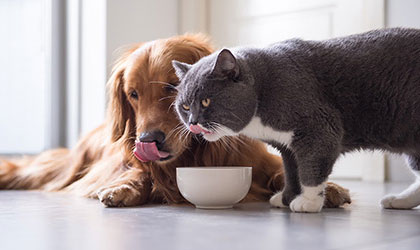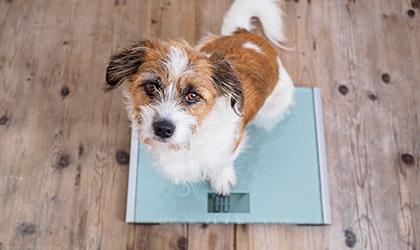
Eating is an inherently emotional ritual. And like it or not, wellbeing and waistlines are intimately interwoven. Low mood can lead to overindulgence in so-called ‘comfort foods’, which are usually high in saturated fat and sugar, and give you a short-lived burst of warmth and fuzziness. It’s a simple pattern, really: we eat unsavoury food to deal with unsavoury emotions. Unsurprisingly, this negative food-feeling connection can eventually lead to weight gain and obesity. New research suggests humans aren’t alone is this mundane mental phenomenon – this habit seems to exist in our four-legged friends too. If you notice any unusual changes in your pet’s eating habits, it may be worth considering some of the underlying factors below.
Stressed, anxious or depressed
If your pet is piling on the pounds, your default might be to assume their insatiable appetite is to blame. You might even search yourself for your own culpability (the odd titbit and treat do add up after all). But a study published in the Journal of Veterinary Behaviour proposes the growing girth of your furry companion may, in fact, stem from emotional turmoili. Just like the fictional character Bridget Jones – the singleton who drowns her love-woes in ice cream and chocolate – vets now believe some pets use food to cope with sadness, stress and anxiety too. Dr Franklin McMillan, a vet and former clinical professor of medicine at the Western University of Health Sciences College of Veterinary Medicine, has reviewed countless studies into the eating habits of laboratory animals and pets, and concludes: “the bottom line is that there is a ton of evidence in humans and animals, like rodents, that stress-induced eating or emotional eating is a very real thing and contributes to obesity, so we should be looking at it in domestic animals too”ii.
Your pets are far more receptive and emotionally intelligent than you may give them credit for. Not only do they experience stress and anxiety from external stimuli – exposure to loud noises, punishment-based training, or being left alone for long periods of time – but they soak up angry, fearful or despondent feelings from family members tooiii. In fact, frequent arguments can be extremely stressful for domestic animals, with many reacting in irritable and fearsome ways. McMillan believes pets may over eat due to ‘disinhibition’ – responding to terrifyingly tail-spinning stimuli rather than natural hunger cuesiv.
Sticking your furry-friend on a diet isn’t always the best way to deal with emotional eating and obesity. Restricting access to food could actually exacerbate your feline or canine’s cortisol levels, and thereby increase their motivation to eat. Arguably, the most effective way to help them trim down is by addressing the root cause of their emotional eating. Unpredictability can be unsettling for a tentative cat or skittish pup. Walk them, play with them, and feed them at the same time every day (a lazy weekend can even throw them off). You may want to reassess their living quarters too. Do they have a comfy bed? Are they exposed to loud noises? Do they have access to fresh water? Above all though, the best advice is to be a calm parent. Pets are masters at detecting the emotional temperature of people, so staying relaxed and confident is one of the best things you can do as their owner.
Emotionally content
Newsflash: pets can over eat when they’re in a state of emotional bliss too v. So while it can be tempting to reward your beloved companions with tons of tasty treats, a diet rich in unhealthy, calorific food will make your furry friends fat: fact. Besides slashing snacks, you may want to reconsider your choice of pet food too. Aim for one that’s formulated with all the key nutrients they need to live optimally .
Loss of appetite
Under eating is another tell-tale sign that your pet isn’t feeling entirely themselves. Loss of appetite could be the early symptom of illness, so it’s important to consult your vet if you notice this. Once that’s ruled out, you can begin to examine what else could be affecting their appetite. Be mindful that pets thrive with a sense of order. Travelling or being in an unfamiliar surrounding, adding a new human or pet to the home, or sudden stress in the household can agitate your furry friends. Fear not though – it’s likely your pet will regain its appetite once it feels secure again.
Take home message
Just like humans, compromised mental health can have far-reaching effects on the eating habits of our four-legged companions, with anxiety and stress triggering both overindulgence and loss of appetite. Yes – pet obesity isn’t always tangled up with emotional stress (some owners are simply irresponsible, and some pets are just food fiends), however in many cases, it’s get far more complex than that. Weight gain can indicate your porky pooch or fat feline are using food to cope with emotional stress. To safe guard their health and happiness, therefore, you need to look beyond diet, and instead address any underlying emotional problems that could incite unusual eating habits. Bottom line: weigh and measure your pet often, track their appetite, and if you suspect anything strange – run it past your vet. Remember, your furry friends are more than just cute and cuddly; they’re highly sensitive creatures that can detect and react to the subtlest changes in their surroundings.
Titbits of trivia
-
Obese cats are more likely to be living in a household with only one or two cats
-
Dogs in single canine houses are more likely to be overweight
-
Female dogs are more susceptible to obesity than their male counterparts
-
25% cats and 45% dogs are obese
-
Scottish terriers, cavalier king Charles, cairn terriers and Labrador retrievers are the most likely breeds to pack on the pounds, while shorthair domestic cats are the most vulnerable of the feline world
References:
-
McMillan. F.D. Stress-induced and emotional eating in animals: A review of the experimental evidence and implications for companion animal obesity. Journal of Veterinary Behavior: Clinical Applications and Research. 2013; 8(5), 376–385.
-
McMillian. F.D. Stress-induced and emotional eating in animals. 376-385.
-
Luño. I., Palacio. J., García-Belenguer. Á., Rosado. B. Emotional eating in companion dogs: Owners’ perception and relation with feeding habits, eating behavior, and emotional state. Journal of Veterinary Behavior: Clinical Applications and Research. 2018; 25, 17–23.
-
McMillian. F.D. Stress-induced and emotional eating in animals. 376-385.
-
McMillian. F.D. Stress-induced and emotional eating in animals. 376-385.



